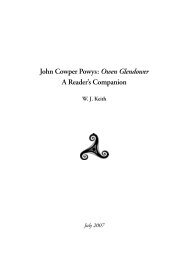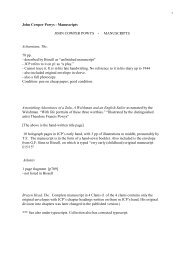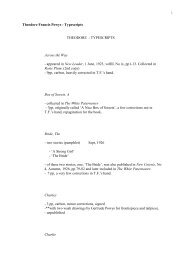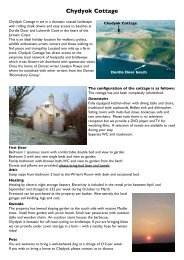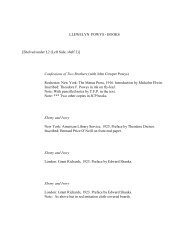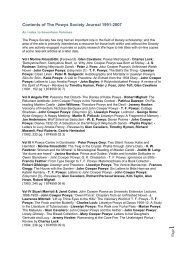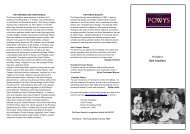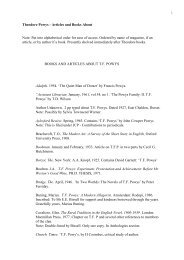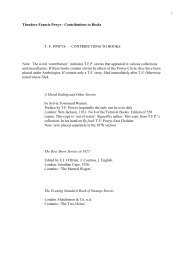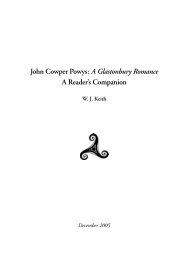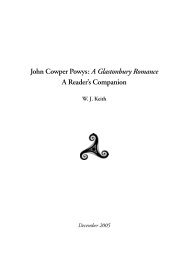J. C. Powys' Autobiography: A Reader's Companion - Site POWYS
J. C. Powys' Autobiography: A Reader's Companion - Site POWYS
J. C. Powys' Autobiography: A Reader's Companion - Site POWYS
Create successful ePaper yourself
Turn your PDF publications into a flip-book with our unique Google optimized e-Paper software.
30 <strong>Autobiography</strong><br />
became “some sort of convent” (99); see also<br />
Gourlay (6).<br />
Holy Road (117) — An unfortunate misprint for<br />
“Holy Rood,” the cross upon which Jesus was<br />
crucified, said to have been discovered by<br />
Helena, the mother of Constantine. The find on<br />
Montacute Hill is also mentioned in Wood and<br />
Stone (1).<br />
Homenas (229) — The Bishop of Papimany, “that<br />
poor old doddipole of a pillar of the Church”<br />
(Rabelais [318]), in Rabelais (Book 4, chs.48–54),<br />
translated as “Greatclod” in the Penguin Classics<br />
edition.<br />
Homer (9, 105, 122, 138, 165, 182, 184, 206, 219, 253,<br />
283, 387, 424, 426, 469, 471, 485, 505, 534, 546, 560,<br />
610, 620–1, 650) — Greek epic poet, supposed<br />
author of the Iliad and the Odyssey, constantly<br />
alluded to in JCP’s writings. His view of the<br />
poems as “the work of two quite different hands”<br />
(621) is repeated in his preface to Homer and the<br />
Aether (9). So, “Homeric” (1, 16, 20, 41, 65, 66, 71,<br />
106, 205, 288, 351, 388, 393, 424, 494; cf. 642).<br />
homo sapiens (15, 36, 496) — The Latin name for<br />
the human species. Homo Sapiens (510) is a<br />
Polish novel by Stanislaw Przybyszewski<br />
(1868–1927), translated into English in 1915.<br />
“honest as I am” (561) — Probably from<br />
Shakespeare’s Othello (II i 202).<br />
“honest cods” (401, 469) — The phrase “honest<br />
cod” appears in Motteux’s completion of<br />
Urquhart’s translation of Rabelais (Book 5, ch.5),<br />
and was much loved by both JCP and Llewelyn.<br />
Llewelyn founded a private club of this name<br />
while at Cambridge; see a photo in Elwin (50).<br />
“honest, honest” (460) — From Shakespeare’s<br />
Othello (V i 155).<br />
honeysuckle rogues (269) — Cf. “thou<br />
honeysuckle villain ... thou honeyseed rogue” in<br />
Shakespeare’s 2 Henry IV (II i 53–4). Cf. also<br />
“honeysuckle rascals” (575), and “honeysuckle<br />
villains” in Rabelais (290).<br />
hoops of steel (237) — From Shakespeare’s<br />
Hamlet (I iii 63).<br />
Horace (599, 619) — Roman poet (65–8 BC), wellknown<br />
for his odes and satires.<br />
Hort, Dr. (646) — F. J. A. Hort (1828–1892), editor<br />
with Bishop B. F. Westcott (q.v.) of the Greek text<br />
of the New Testament.<br />
Horus (400) — The falcon-headed sun-god in<br />
Egyptian mythology, brother of Osiris.<br />
hospitable café (392) — Florian’s, in St. Mark’s<br />
Square, famous for its location and high prices.<br />
Hospitallers (325) — The military-religious Order<br />
of the Hospitallers of St. John of Jerusalem,<br />
founded in 1113. They were later transformed<br />
into the Knights of Malta.<br />
House of Rimmon — See “bowed down ...”<br />
“How much wood ...” (185) — A traditional<br />
“tongue-twister” existing in many similar forms.<br />
“How shall I ... sandal-shoon!” (219) — From<br />
Shakespeare’s Hamlet (IV v 23–6).<br />
“huffed” (496) — A term from the game of<br />
draughts, when one player takes the counter of<br />
another. Cf. “huffing” (Wolf Solent [350]).<br />
hugger-mugger (122; cf. 431) — In disorder. A<br />
favourite JCP word, possibly borrowed from<br />
Shakespeare’s Hamlet (IV v 83). See also<br />
Weymouth Sands (85, 526, 554) and Owen<br />
Glendower (567).<br />
Hugo (420) — Victor Hugo (1802–1885), French<br />
poet and novelist. The work alluded to here is<br />
Notre Dame de Paris (1831). JCP wrote an essay on<br />
him in Suspended Judgments.<br />
“human-too-human” (71, 178, 224, 445, 626) —<br />
Alluding to the title of a work by Nietzsche (q.v.).<br />
Hunter, Reginald (563–4) — An admirer of JCP as<br />
lecturer; also the first husband of Gamel<br />
Woolsey, with whom Llewelyn was in love in the<br />
late 1920s. Hunter was also known as Rex.<br />
“hybris” (165) — Pride (Greek), the ingredient of<br />
the tragic flaw in Greek tragedy, a term used by<br />
Homer and transformed by Aristotle in his<br />
Poetics. Now usually transliterated as “hubris.”<br />
hydrocephalic (11, 255) — Cf. Johnny Geard’s<br />
condition in A Glastonbury Romance (136).<br />
Hymettian (215) — Relating to the honey from the<br />
bees of Mount Hymettus, three miles south of<br />
Athens.<br />
Hypatia (555) — A neoplatonic philosopher in<br />
Alexandria, daughter of a mathematician, the<br />
subject of a novel by Charles Kingsley (1851).<br />
I<br />
“I am that I am” (629) — Cf. Exodus 3:14. Cf.<br />
Maiden Castle (473) and Porius (102, 418).<br />
“I am the Truth” (360, 428) — John 14:6. Also<br />
quoted in The Pleasures of Literature (51) and<br />
Rabelais (385); cf. In Defence of Sensuality (138).<br />
“I believe because it’s impossible” (465) — A<br />
notorious assertion by Tertullian (q.v.).<br />
I do not feel ... not completely realized (36) —<br />
The double negative is awkward, perhaps not<br />
intended. The second “not” may be an error.<br />
“I do not set my life at a pin’s fee” (164) — From<br />
Shakespeare’s Hamlet (I iv 45), also quoted in<br />
Powys to Sea-Eagle (197).<br />
I recollect ... left no memory (5–6) — For a brief<br />
but excellent analysis of this paragraph, see<br />
Southwick (16–7).



